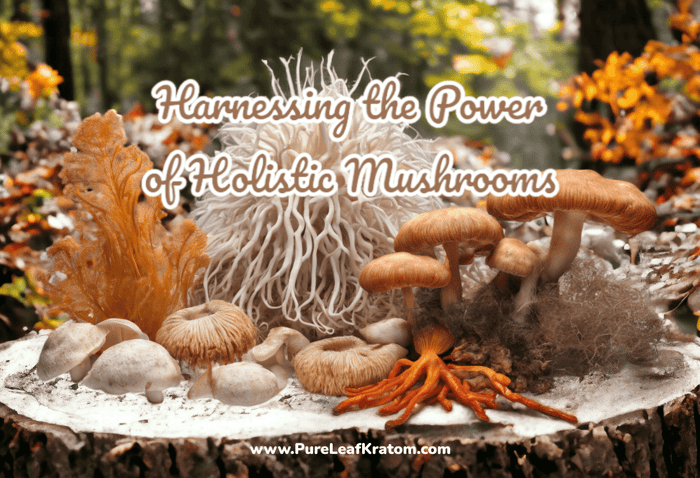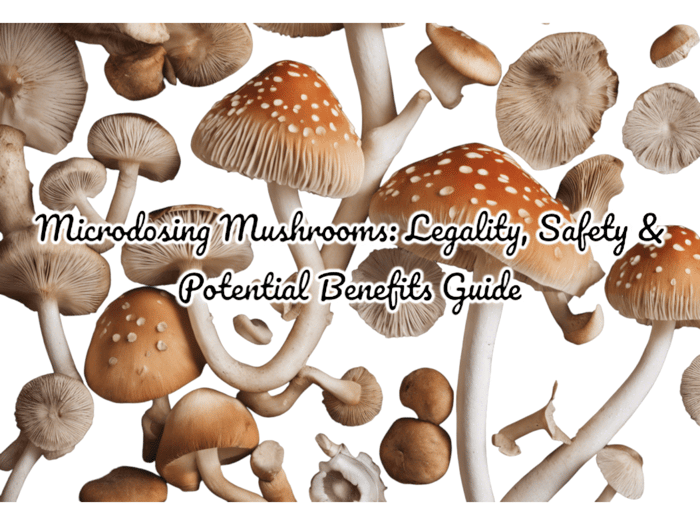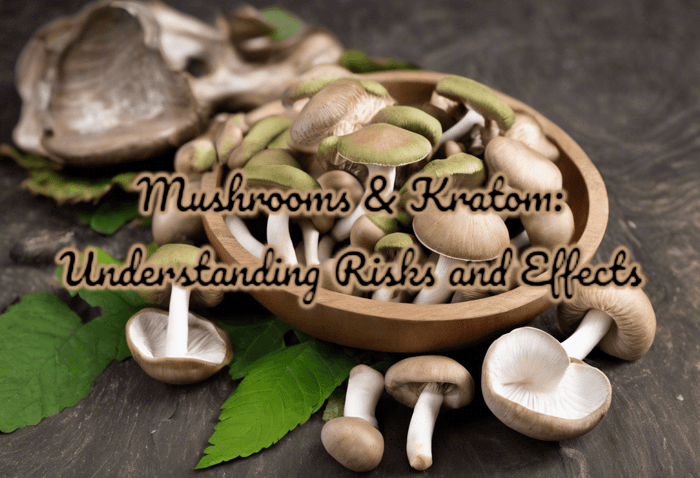
Harnessing the Power of Holistic Mushrooms: Lion's Mane, Cordyceps and Turkey Tail Explained
The Significance of Holistic Mushrooms in Wellness Practices
The Basics of Holistic Mushrooms
A Minor History of Holistic Mushrooms
Holistic mushrooms have been part and parcel of human society for centuries. In ancient times, different cultures globally revered them for their medicinal properties. Several historical records indicate that they were essential in Old Chinese and Egyptian civilizations.
Defining a Holistic Mushroom
A holistic mushroom is a fungi species known for its health-promoting components. Unlike ordinary mushrooms, holistic ones contain complex carbohydrates, beta-glucans, and other beneficial compounds that make them valuable for human health.
Health Implications of Holistic Mushrooms
Broad Benefits of Holistic Mushrooms to Wellness
A plethora of evidence supports the health benefits of holistic mushrooms. They have potent antioxidant, anti-inflammatory, anti-cancer, and immune-supporting properties which contribute to overall wellness.
Utilization of Holistic Mushrooms in Medicine
The pharmacological importance of holistic mushrooms in both traditional and modern medicine cannot be understated. For thousands of years, traditional healers have used them to treat various ailments. Concurrently, in modern medicine, research shows that they have potential anti-tumor, anti-viral, and neuroprotective effects, amongst others.
Distinguishing Holistic Mushrooms from Ordinary Mushrooms
Predominant Features
Holistic mushrooms primarily stand out because of their rich medicinal attributes. They have complex compounds like beta-glucans that are essentially absent in ordinary mushrooms. These compounds have been found to bolster immune functions, thus enhancing wellness.
Safety Considerations
While holistic mushrooms have enormous health benefits, appropriate measures still need to be taken when consuming them. Some can interact with certain medications or cause allergies. It is therefore advisable to consult a healthcare professional before incorporating them in one's wellness routine.
Understanding Lion's Mane Mushroom and its Applications
The Lion's Mane mushroom, also known as Hericium erinaceus, is a unique fungus recognized for notable wellness-promoting properties. This section is devoted to uncovering the specifics of the Lion's Mane's physical characteristics, historical importance, health advantages, and its effective use.
The Nature and Historical Importance of Lion's Mane
The Looks and Habitat of Lion's Mane
Lion's Mane is distinguished by its distinctive, white, and fluffy appearance, which resembles a lion's mane. Typically, they are found growing on hardwood logs or trees, particularly during the fall months.
Significance of Lion's Mane in History and Culture
Lion's Mane has a rich historical background, primarily in Asian cultures, where it was used for culinary and medicinal purposes. Known for its neuroprotective properties, it was often used to improve cognitive health and treat various ailments.
The Wellness Promoting Aspects of Lion's Mane
Cognitive Function and Nerve Health
One of the primary advantages of Lion's Mane is its potential impact on cognitive function. This mushroom supports nerve health by promoting nerve growth factors. Studies indicate that it potentially supports the growth and repair of nerve tissues, thus improving cognitive function.
The Role of Lion's Mane in Digestive Health
Besides mental health, Lion's Mane contributes to enhancing gut well-being. Research suggests that it may help maintain the protective mucous membrane lining the gut, playing a potential role in the prevention of stomach ulcers.
Lion's Mane and Mental Health
Increasing evidence suggests a beneficial role for Lion's Mane in managing mental health disorders. Its regular consumption may potentially alleviate symptoms of depression and anxiety, as outlined in a study.
Safely Utilizing Lion's Mane for Health
Methods and Dosage of Lion's Mane Consumption
Lion's Mane can be consumed in various forms, including capsules, powders, and teas. The suggested dose may range depending upon an individual's general health, age, and other conditions. However, typical dosages are in the range of 500-1500 mg per day, taken in multiple sessions throughout the day.
Guidelines for Safe Consumption of Lion's Mane
While Lion's Mane is generally safe for consumption, individuals should always source it from reliable providers. Regardless of the many benefits, it is crucial to seek consultation from a healthcare provider before starting any new supplement routine as the dosages can vary widely based on individualized needs and healthcare advice.
This information is based on general guidelines and research findings available in the public domain. It is intended for educational purposes only and not as specific advice or recommendations for individual health conditions. Dosages can vary widely based on individual needs, health status, and advice from healthcare professionals. Always consult with a healthcare provider before starting any new supplement regimen.
Unveiling the Benefits of Turkey Tail
Welcome to the third part of our series where we uncover the benefits and secrets of the world's most powerful mushrooms. In this section, we will be focusing on Turkey tail - a mushroom worthy of your attention and perhaps even a spot in your supplement cabinet.
Getting Acquainted with Turkey Tail
About its Appearance and Habitat
Turkey tail, or Trametes versicolor, is a common mushroom native worldwide. With its striking pattern resembling a turkey's tail - multiple colored zones with alternating browns, whites, reds, and blues - this mushroom is hard to miss. Turkey tail typically grows densely on the deadwood of broadleaf trees and can be found year-round, proving that some of the most potent natural health aids might be hiding in plain sight all around us.
Historical Significance and Cultural Connections
For centuries, turkey tail has been recognized in the Asia for its medicinal properties. Traditional Chinese Medicine prescribes turkey tail as a tonic, while in Japan, it has been a core element of cancer treatments since the 1960s.
Discovering Health Benefits of Turkey Tail
Note: The disclaimer outlined above applies to each of the following sub-sections. As the benefits of Turkey tail are specific to each individual, always consult a healthcare provider before starting a turkey tail supplement regimen.
Immunity Boosting Properties
One of turkey tail's most highlighted attributes are its immunity-boosting properties. It contains polysaccharides, specifically beta-glucans, that stimulate the immune system. The function of these beta-glucans includes activating macrophage and natural killer cells - both of which play significant roles in immune response.
Gut Health and Turkey Tail
Turkey tail also provides benefits for gut health. Possessing a rich source of prebiotics, it fosters the growth of beneficial bacteria in the digestive tract, thus, making it an ally for all those commanding better gut health.
Potential Cancer-Fighting Properties
Fascinatingly, turkey tail's potential benefits extend to fighting cancer. Early research indicates that a compound in turkey tail, polysaccharide-K (PSK), might help in inhibiting cancer cell growth. The The National Cancer Institute reports that patients treated with PSK in addition to chemotherapy experienced higher survival rates.
Utilizing Turkey Tail to Your Advantage
Dosage and Consumption Methods
Turkey tail is often taken in a powdered form as a dietary supplement. The typical daily dosage ranges from 1 to 3 grams, but it may vary based on individual requirements and the advice of a healthcare professional. This mushroom also appears frequently in tea blends for an invigorating and health-enhancing brew.
Safe Consumption of Turkey Tail
Generally, turkey tail is considered safe for consumption. However, like other supplements, moderate intake is advised until you understand how your body reacts. Ensure to source your supplements from reputable sources, and always check for harmful additives. Furthermore, if you're under any medication, pregnant, or nursing, a healthcare provider's advice is essential before beginning a new supplement.
Cordyceps: An Insight
Among the varied range of holistic mushrooms, Cordyceps holds a unique status for its array of health benefits and distinctive history.
Distinctive Features and Habitat of Cordyceps
Resembling grass-like fiber strands, Cordyceps is a genus of parasitic fungi mainly located at high altitudes of the Himalayan region. The unique fungi specifically grow on insects and arthropods forming a "fungal body" that protrudes from the host's body. The species most commonly used for health supplementation, Cordyceps Sinensis and Cordyceps Militaris, display an orange/red or dark brown color.
Historical Importance and Cultural Significance of Cordyceps
It is a well-documented fact that Cordyceps has been hailed for centuries in traditional Chinese and Tibetan medicine. It was originally used for a wide variety of health issues such as lung illnesses, fatigue, and to re-energize the weak or elderly. The rarity and high cost associated with Cordyceps made it a status symbol, exclusively consumed by elite classes in earlier times.
Attributes of Cordyceps for Enhanced Health
The attributes of Cordyceps are highly valued as they are believed to aid in overall wellbeing and longevity.
Enhancement in Physical Performance
One of the most recognized benefits of Cordyceps is the potential to boost physical strength and energy. Research indicates that the mushroom may enhance the body's production of the molecule adenosine triphosphate (ATP), essential for delivering energy to the muscles. This can potentially result in improved athletic performance and vitality.
Reputed as a Natural Aphrodisiac
In many cultures, Cordyceps has a reputation as a natural enhancer of additional energy; some even credit the mushroom with aphrodisiac properties. While conclusive evidence needs more research, it is suggested that the mushroom might improve various aspects of sexual health.
Potential Anti-aging Characteristics
Cordyceps may also have anti-aging properties, credited to the antioxidants found in the mushroom. These antioxidants may play a role in protecting against cellular damage, hence potentially aiding in the preservation of youthful skin and overall health. However, further research is necessary to substantiate this potential benefit.
Guide to Utilizing Cordyceps
Like every supplement, the consumption of Cordyceps should follow certain guidelines to ensure safety and maximize benefits.
Recommended Dosage and Consumption Methods
The use of Cordyceps can vary greatly depending on individual health conditions and needs. As a general guideline, a daily dose of about 1,000 – 3,000 milligrams is considered safe for most adults. The mushroom can be consumed in several forms including capsules, extracts, or as whole dried pieces usually brewed in hot water to make tea.
Precautions for Safe Consumption
It is critical to bear in mind that while research suggests health benefits of Cordyceps, it's important to always consult with a health care provider before starting any new supplement. Especially people with known allergies, pregnant women or those with chronic conditions should take extra precaution and discuss any potential interactions or side-effects.
"This information is based on general guidelines and research findings available in the public domain. It is intended for educational purposes only and not as specific advice or recommendations for individual health conditions. Dosages can vary widely based on individual needs, health status, and advice from healthcare professionals. Always consult with a healthcare provider before starting any new supplement regimen."
Noteworthy Holistic Mushrooms
In the realm of holistic healing, three other mushrooms frequently receive recognition for their health benefits. These include the Reishi, Chaga, and Shiitake mushrooms, each boasting unique properties that differentiate their impact on human health.
Introduction to Reishi, Chaga, and Shiitake Mushrooms
Reishi Mushroom
Often referred to as the "Mushroom of Immortality," Reishi has been used in traditional medicine for centuries. It is known to demonstrate strong anti-oxidative effects, which may aid in boosting the immune system along with promoting cellular health.
Chaga Mushroom
A staple in herbal medicine, Chaga mushrooms are believed to carry substantial immune-boosting properties. They're rich in a variety of vitamins, minerals, and antioxidants, which could have potential anti-inflammatory effects.
Shiitake Mushroom
Shiitake mushrooms are not only a popular ingredient in many dishes but also reputed for their health-promoting qualities. Studies suggest that they may have potential to support the immune system and serve as a source of dietary fiber.
Health Benefits of Reishi, Chaga, and Shiitake Mushrooms
Each of these mushrooms carries a unique set of benefits, further cementing their value in holistic health.
Reishi Benefits
The antioxidant-rich profile of Reishi mushrooms may aid in supporting the immune system and cellular health. Its effects on reducing stress and improving sleep have also been observed in some studies.
Chaga Benefits
Chaga's high antioxidant content could play a role in potentially supporting immune health and combating inflammation. Some research even suggests its potential in helping to slow down the aging process due to its antioxidant properties.
Shiitake Benefits
Shiitake mushrooms are not only a delicious addition to meals but may also support immune function and act as a significant source of dietary fiber. Some research has noted its possible cholesterol-lowering properties and potential in boosting cardiovascular health.
Choosing the Right Holistic Mushroom for You
Selecting the ideal holistic mushroom for individual use depends on a multitude of factors, and requires a measured and informed approach.
Assessing Your Health Needs
Analysing Individual Health Goals
Health goals widely vary from person to person. Studies suggest that Lion's Mane mushrooms may be beneficial for cognitive health and neuroprotection, Cordyceps may aid in increasing athletic performance and improving respiratory health, while Turkey Tail may be beneficial for immune support.
Considering the Uniqueness of Individual Bodies
Different bodies may respond to holistic mushrooms in diverse ways. The potential impact of holistic mushrooms might be influenced by individual factors such as genetic predispositions, health status, medication, and other supplements being taken. Moreover, the digestion and absorption of nutrients from mushrooms can also vary based on an individual's digestive health.
Research and Awareness
Importance of Thorough Research
Thorough research is essential in order to make informed choices about holistic mushrooms. It is recommended to read scientific studies, reviews, and ethical sourcing information from reliable sources. Understanding the specific benefits of each mushroom, their traditional uses, and their nutritional profile is key. There is an array of scientific literature available on the health benefits of holistic mushrooms such as Lion’s Mane, Cordyceps and Turkey Tail.
Awareness of Potential Side Effects
While holistic mushrooms are generally safe for most people, potential side effects should not be overlooked. For instance, some people might experience digestive upset, allergic reactions, or interactions with medication when consuming certain holistic mushrooms. WebMD reports that Turkey Tail, for example, can cause darkening of the fingernails or skin, and changes in bowel habits.
Consultation with Healthcare Professionals
Before introducing any new supplements, including holistic mushrooms, into a diet, it is advisable to consult with healthcare professionals. Doctors or registered dietitians can provide personalized advice based on individual health needs, conditions, and medication. They can also monitor any potential side effects or interactions.
Disclaimer
The products discussed here and any claims or suggestions made have not been evaluated by the Food and Drug Administration (FDA). This content is not intended to diagnose, treat, cure, or prevent any disease.
The information on this website is provided for general informational purposes only and should not be relied on as the sole basis for making decisions – we encourage consulting primary, qualified, more complete, or professional sources. Any reliance on the material on this site is at your own risk.
Information shared on this site may be updated at any time and may include information or data that are no longer current, accurate, or complete and is provided for your reference only. We are not obligated to update published content, and it is the reader’s responsibility to monitor any changes and to consult with primary, qualified, more complete, or professional sources.
We make no guarantees regarding the completeness, accuracy, or reliability of the information provided, nor do we warrant that any products, services, or materials offered will meet individual expectations. Use of this site and its content is at your own discretion and risk.




